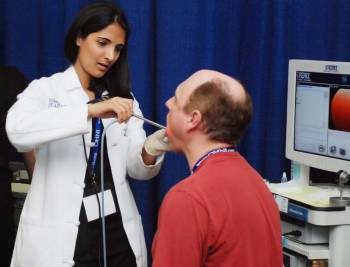- Question: How do the ingredients in e-cigarettes and vaporizers affect respiratory health? - August 16, 2019
- Bad Technique and Vocal Injury - January 9, 2019
- Is Edible Marijuana Dangerous for the Voice? Myths Dispelled - December 18, 2018
- Surprise! You have a hemorrhage - January 31, 2018
- Graves’ Disease: Treatment Overview - September 25, 2017
- Adele and the Stigma of Vocal Injury - July 11, 2017
- Vocal Curbside Consult: How does the thyroid affect the voice? - May 16, 2017
- Vocal Curbside Consult: How do hormones affect the voice? - May 3, 2017
- Vocal Curbside Consult: How do emotion and stress affect the voice? - April 17, 2017
- Vocal Curbside Consult: Vocal Recovery After Illness - April 7, 2017
 It’s hard to find a good voice teacher for the same reason it’s hard to find a good voice doctor. When you are talking about the human voice and an outside person’s ability to sense what is wrong, it is not a precise science. A doctor or a vocal coach needs to use clues to fix a problem that they themselves cannot feel. This is extremely difficult!
It’s hard to find a good voice teacher for the same reason it’s hard to find a good voice doctor. When you are talking about the human voice and an outside person’s ability to sense what is wrong, it is not a precise science. A doctor or a vocal coach needs to use clues to fix a problem that they themselves cannot feel. This is extremely difficult!
Aside from this, why is picking someone good so hard? One problem is relying on reputation alone. I have had singers with vocal problems come to me for a second opinion, telling me they have gone to Dr. X, who is “supposed to be the best.” Yet somehow they left that office without having had a videostroboscopy. Indeed, that doctor wasn’t even a fellowship-trained laryngologist! As a voice physician, I can’t imagine how you would treat a singer without doing a strobe. But because people do not know about the minimum standards they should be checking for, they must use word of mouth to guide their choice.
When analyzing a voice doctor, you know you are in good hands if the doctor:
- is Board Certified in Ear, Nose, and Throat
- is Fellowship trained in Laryngology (Voice Medicine)
- has (and performs) stroboscopy on all voice patients
- explains your voice problem to you in a way you can understand
- does not simply push reflux medications, steroids, or antibiotics on you every time you have a voice complaint
Voice teachers are even harder than voice doctors to analyze. What are the bullet points for a good voice teacher? I have asked numerous people (artists, speech pathologists, and voice teachers) to try to come to a consensus on minimum standards. Some things that came up repeatedly were:
- A degree in voice/vocal performance (undergraduate, masters, etc)
- A history of satisfied clientele (with whom you can speak)
- Ease with several styles of singing
Things to avoid:
- Worked with celebrities
This last point came up constantly. One coach states “Just because you gave a famous singer one lesson (and put their name on your website), does not mean you are good.” Celebrities often work with many coaches all over the country, so no one coach can take “credit.” You are also discounting the singer’s abilities when you say that one coach made this singer great. Incidentally the same goes for a doctor. Working on a celebrity does not make you credible. Your work makes you credible. This is why speaking to students/patients or reading testimonials is more accurate than any roster of famous clientele.
Unfortunately, it is difficult to find the right person to help you with your voice problem. Anyone can put their website up and call themselves a voice coach, just like any ENT can put “Voice Doctor” on their website. This doesn’t mean they are trained to help you with your voice.
The two most important things you should look for are: credentials and results.
Know what credentials matter (as listed above) and make sure the person you are seeing has them. When you’ve found someone who meets the minimum criteria of training, ask about results. The only way to know this is to talk to satisfied customers. Read their testimonials. Ask your voice professional to give you access to their clients or ask your singer friends who they see. Nothing is more valuable than a personal referral.
Finally never stick with someone just because they are “supposed to be good.” Go with your instincts; if you don’t feel you are with the right person, keep looking until you do.
Read patient stories about Dr. Reena Gupta from The Division of Voice at the Osborne Head and Neck Institute.
To learn more about Dr. Reena Gupta, click here.




